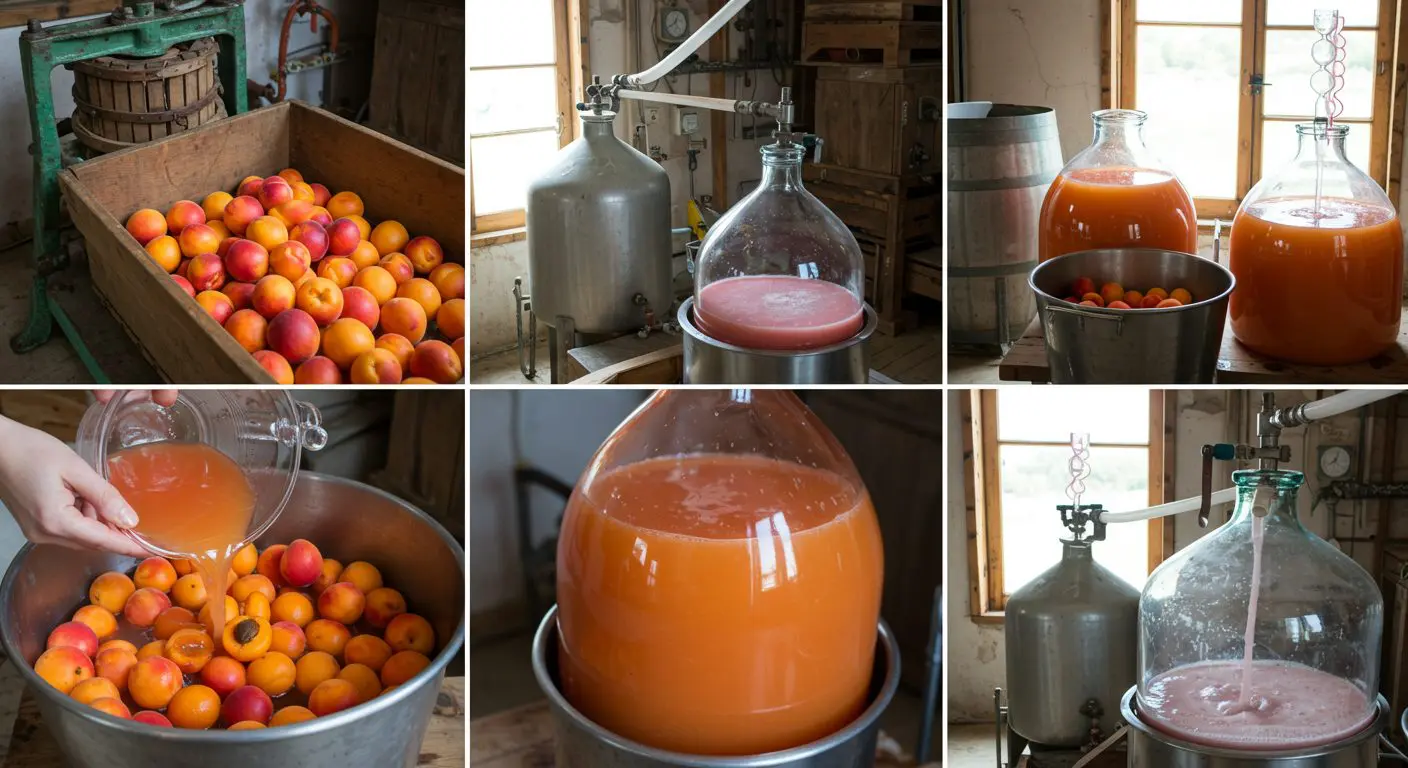This post may contains affiliate links. Read our full disclosure here.
The health benefits of apricot wine have been gaining attention lately, and for good reason! This delightful fruit-based wine offers more than just a pleasant drinking experience—it comes packed with surprising nutritional benefits that might make your next glass even more satisfying. As a longtime fan of alternative wines, I’ve found that apricot wine stands apart from traditional grape varieties with its unique flavor profile and potential wellness perks.

When enjoyed in moderation, apricot wine delivers a combination of antioxidants, vitamins, and natural compounds that support overall health. Unlike heavily processed commercial wines, this stone fruit creation maintains more of its natural goodness through simpler production methods. Whether you’re looking to expand your wine horizons or searching for something with potential health advantages, apricot wine deserves a spot in your collection.
What Makes Apricot Wine Unique?

Apricot wine stands out in the world of alcoholic beverages because it’s crafted from fermented apricots rather than grapes. This foundation gives it a distinctive golden amber color and a naturally fruity aroma that simply can’t be replicated by grape wines. The flavor profile sits beautifully between floral and citrus notes, often with a pleasant sweetness that makes it approachable for even occasional wine drinkers.
What really sets apricot wine apart is its base fruit. Apricots are nutritionally dense stone fruits packed with vitamins and fiber that contribute to the wine’s potential health benefits. Unlike many commercial grape wines that undergo extensive processing, apricot wine is frequently produced by smaller artisan winemakers who focus on preserving the natural qualities of the fruit.

Here’s why apricot wine deserves attention:
- Made from vitamin-rich apricots with substantial fiber content
- Features a balanced sweet-tart profile with subtle floral undertones
- Often produced through traditional methods by small-batch winemakers
- Serves as an excellent introduction for those new to fruit wine varieties
The antioxidant profile of apricots transfers partially to the wine, creating a beverage that offers both sensory pleasure and potential wellness support. While most people think of red wine when discussing health benefits, apricot wine deserves recognition for its unique nutritional composition.
Nutrients and Compounds in Apricot Wine

Despite the fermentation process, apricot wine retains many beneficial compounds from the original fruit. The health benefits of apricot wine come largely from these preserved nutrients that survive the winemaking process. While you shouldn’t consider it a replacement for eating whole fruits, it does offer some nutritional advantages over standard alcoholic beverages.
Apricot wine typically contains measurable amounts of beta-carotene, which your body converts to Vitamin A. This powerful antioxidant supports eye health and immune function. The wine also maintains some of the original fruit’s Vitamin C content, though in reduced quantities compared to fresh apricots.

Notable compounds in apricot wine include:
- Beta-carotene for vision and immune support
- Vitamin C that contributes to skin health and immunity
- Potassium, which plays a role in heart and blood pressure regulation
- Natural enzymes and polyphenols with anti-inflammatory properties
“Apricot wine brings together the pleasure of a good pour with the quiet support of fruit-based wellness.”
The minimal industrial processing typical in apricot wine production helps preserve more of these beneficial compounds. Artisanal producers often prioritize gentle handling techniques that maintain the integrity of the original fruit’s nutrients, resulting in a wine that’s not just tasty but potentially good for you when enjoyed responsibly.
Health Benefits of Apricot Wine in Moderation

The health benefits of apricot wine shine brightest when consumption remains moderate. Like other wines, apricot wine can support various aspects of wellness when enjoyed sensibly as part of a balanced lifestyle. The key is keeping portions reasonable – around 4-5 ounces a few times weekly seems to hit the sweet spot for potential benefits without overdoing alcohol intake.
Cardiovascular support ranks among the most notable potential benefits. The polyphenols and potassium content may help maintain healthy blood vessel function, similar to the effects observed with moderate red wine consumption. The antioxidants derived from apricot skins and pulp can help combat free radicals, potentially offering cellular protection.

Potential wellness advantages include:
- Heart health support through polyphenols and potassium
- Antioxidant protection from natural fruit compounds
- Stress reduction when enjoyed in relaxed social settings
- Possible anti-inflammatory effects from natural enzymes
“Like other fruit wines, apricot wine shows promise in supporting cardiovascular and cellular health—when consumed responsibly.”
Research on moderate wine consumption indicates that limited servings several times weekly may tap into these wellness properties without the negative effects of excessive alcohol. According to Wikipedia’s overview on wine and health, the balance between potential benefits and risks depends heavily on consumption patterns and individual health factors.
For those interested in exploring other fruit wines with health properties, blackberry wine offers a similarly impressive nutritional profile with its own unique benefits.
How Apricot Wine Compares to Grape-Based Wines

When comparing apricot wine to traditional grape varieties, several key differences emerge that highlight the unique aspects of this fruit wine. The most obvious distinction is the base ingredient, which fundamentally changes both the flavor profile and potential health benefits. Where grape wines deliver their distinctive tannins and acidity, apricot wine offers a softer, more approachable character that many find easier to enjoy.
| Factor | Apricot Wine | Grape Wine |
|---|---|---|
| Base Ingredient | Apricots (stone fruit) | Grapes |
| Sugar Content | Often higher, naturally sweet | Ranges from dry to sweet |
| Antioxidants | Apricot-based flavonoids | Tannins, resveratrol, polyphenols |
| Flavor Profile | Sweeter, mellow | Can be bold and tannic |
| Alcohol Volume | Often lower (8-12%) | Typically ranges from 11-15% |
The health benefits of apricot wine differ from grape wines primarily in their antioxidant composition. While red wine is famous for resveratrol, apricot wine delivers its own set of beneficial plant compounds derived from the stone fruit. The naturally lower alcohol content of most apricot wines may also be advantageous for those seeking moderation.
For those just beginning to explore wine or who prefer lighter options, apricot wine provides an excellent entry point. It’s typically served slightly chilled, which brings out its fruity character, and pairs beautifully with both sweet and savory foods. Many people who find traditional wines too astringent or bitter discover that apricot wine offers a more accessible alternative with its own health merits.
If you enjoy exploring fruit-based wines, you might also appreciate blueberry wine, which offers complementary flavor profiles and health properties.
Pairing Apricot Wine with Meals for Best Effects

Pairing apricot wine with the right foods doesn’t just create delicious flavor combinations—it can actually optimize the health benefits of apricot wine through better digestion and controlled alcohol absorption. The right food pairings slow alcohol uptake into your bloodstream, helping maintain moderation naturally while enhancing nutrient absorption from both the wine and your meal.
The naturally sweet-tart balance of apricot wine makes it versatile for pairing, but it works exceptionally well with certain foods. Soft, creamy cheeses like Brie or Camembert create a beautiful contrast with the wine’s fruit notes. The fats in cheese also help temper alcohol absorption, making this combination both tasty and strategic for health-conscious sipping.

Try serving apricot wine with these complementary foods:
- Soft or aged cheeses that contrast with the wine’s sweetness
- Spiced or nutty desserts like baklava or almond cake
- Light meats such as roasted chicken or grilled pork tenderloin
- Picnic favorites including olives, cured meats, and artisan bread
Serving temperature makes a difference too. Slightly chilled apricot wine (around 50-55°F) preserves its aromatic qualities while moderating the perception of sweetness. This temperature range also reduces alcohol volatility, potentially making it easier to maintain sensible portions and fully experience the wine’s fruity character.

For those who enjoy lighter fruit wines with complementary pairing possibilities, strawberry wine offers another excellent option with its own unique flavor profile and health attributes.
Cultural and Historical Uses of Apricot-Based Wines

Apricot wine boasts a rich cultural heritage that stretches back centuries, particularly in regions where apricots flourish naturally. This isn’t a modern health trend but a traditional beverage with deep historical roots in several cultures. Understanding this background adds another dimension to appreciating both the taste and health benefits of apricot wine.
In countries like Armenia, Georgia, and throughout Central Asia, apricot wine production has been a seasonal tradition for generations. These regions recognized the preservative value of fermentation long before modern refrigeration, transforming seasonal apricot harvests into wines that could be enjoyed year-round. The practice evolved not just for preservation but as a valued part of local wellness traditions.

Historical and cultural significance includes:
- Traditional importance in Armenia, Bulgaria, Georgia, and Central Asian countries
- Seasonal production tied to annual apricot harvests in rural communities
- Use in celebrations, family gatherings, and traditional wellness practices
- Continuation of homemade wine traditions across multiple cultures
Many families in these regions still produce apricot wine using recipes and techniques handed down through generations. What makes these traditional methods particularly interesting from a health perspective is their minimal intervention approach—using fewer additives and preservatives than commercial production. This often results in a more natural product that retains more of the original fruit’s beneficial properties.
For those interested in other traditional fruit wines with cultural significance, Japanese plum wine (Umeshu) provides another fascinating example of fruit wine with both cultural importance and potential health benefits.
Are There Risks to Drinking Apricot Wine?

While the health benefits of apricot wine are worth noting, honesty requires acknowledging potential downsides too. Like all alcoholic beverages, apricot wine should be approached with moderation and awareness of individual health circumstances. Understanding these considerations helps ensure your enjoyment remains truly beneficial.
Sugar content presents one primary concern. Apricot wine typically contains higher natural sugar levels than many dry grape wines. This can affect blood sugar regulation and contribute to calorie intake, something to consider if you’re watching either factor. The sweetness can also make it easy to drink more than intended, as the pleasant taste might mask the alcohol content.

Important considerations include:
- Higher sugar content compared to dry red wines
- Potential medication interactions common to all alcoholic drinks
- Risk of diminishing health benefits through overconsumption
- Variable alcohol tolerance, especially with sweeter, more approachable wines
Medical experts generally advise limiting wine consumption to one 5-ounce glass per day for women and two for men. This recommendation applies to apricot wine as well, despite its potentially lower alcohol content. Individual factors like body weight, existing health conditions, and medication use may further affect appropriate consumption levels.

If you have specific health concerns or take medications, consulting with a healthcare provider before making apricot wine part of your routine makes good sense. Many medications interact with alcohol, and some health conditions may be aggravated even by moderate consumption.
Where to Buy or Try Apricot Wine

Finding quality apricot wine might require a bit more effort than picking up a bottle of cabernet at the supermarket, but the search is worthwhile for both taste and health benefits. The best sources often provide wines with fewer additives and more authentic fruit character, potentially preserving more of the health benefits of apricot wine.
Local wineries have become increasingly adventurous in recent years, with many expanding beyond grape varieties to include fruit wines in their offerings. These smaller producers often prioritize quality over mass production, resulting in apricot wines that maintain more of the original fruit’s beneficial compounds. Visiting local wineries also provides the opportunity to learn about production methods and taste before purchasing.

Places to source good apricot wine include:
- Local and regional wineries specializing in fruit wines
- Artisanal wine clubs and specialty wine shops
- Farmers’ markets and seasonal fruit stands in apricot-growing regions
- Online retailers focused on specialty or European wines
If your search proves challenging, consider making your own! Home winemaking has become increasingly popular, and apricot wine is actually one of the more forgiving varieties for beginners. By crafting it yourself, you control both the ingredients and the sweetness level, potentially creating a healthier version than commercial alternatives.
How to Make Apricot Wine at Home

Creating your own apricot wine at home offers a hands-on way to ensure quality ingredients while connecting with the traditional art of winemaking. The process isn’t as complicated as you might think, and homemade versions often maximize the health benefits of apricot wine by avoiding commercial additives. Plus, there’s something deeply satisfying about serving a wine you’ve crafted yourself.
The basic technique involves fermenting fresh apricots with sugar and wine yeast, allowing natural processes to transform fruit sugars into alcohol while preserving many of the beneficial compounds from the original fruit. With proper sanitization and patience, you can produce a delightful apricot wine in your own kitchen with minimal specialized equipment.
Homemade Apricot Wine Recipe

Learn how to make apricot wine at home with this easy 1-gallon recipe. Using fresh apricots, wine yeast, and simple ingredients, you’ll create a smooth, naturally sweet wine in just a few months.
Type: Beverage / Wine
Cuisine: Homemade / Traditional
Keywords: apricot wine recipe, homemade fruit wine, DIY wine recipe, apricot wine instructions, 1 gallon wine recipe, home winemaking, easy fruit wine, apricot wine with yeast, natural apricot wine, small batch wine
Recipe Yield: 1 gallon (approx. 4–5 1 gallon (approx. 4–5 bottles)bottles)
Calories: 120 (estimate)
Preparation Time: 30 minutes (active)
Cooking Time: Fermentation Time: 4–6 weeks (primary) + 3 months aging
Total Time: About 4 months
Recipe Ingredients:
- 3 lbs ripe, pitted apricots
- 2.5 lbs granulated sugar
- 1 tsp acid blend
- 1 crushed Campden tablet
- 1 tsp pectic enzyme
- 1 packet wine yeast (Lalvin EC-1118 recommended)
- 1 gallon filtered water
Recipe Instructions: Sanitize Equipment: Clean and sanitize all tools, containers, and utensils thoroughly. Prepare the Apricots: Place pitted apricots in the fermentation bucket. Add the crushed Campden tablet and fill with water. Cover and let sit 24 hours. Add Sugar and Enzymes: Stir in sugar, acid blend, and pectic enzyme until sugar dissolves fully. Wait another 12 hours. Add Yeast: Sprinkle wine yeast over the mixture. Cover loosely and ferment at room temperature for 5–7 days, stirring daily. Strain and Transfer: Strain out solids through a mesh strainer or cheesecloth. Pour liquid into a clean glass carboy, attach the airlock, and ferment 4–6 weeks. Rack and Age: Siphon wine off sediment into a clean carboy. Age for at least 3 months in a cool, dark place. Bottle: Once clear and fully fermented, transfer to sanitized bottles, cork, and store.
5
Pros
- Pure, additive-free homemade wine
- Fully customizable sweetness and flavor
- Connects you to traditional winemaking methods
- Produces a unique, artisan-quality beverag
Cons
- Requires patience (months of fermentation/aging)
- Needs proper sanitization to avoid spoilage
- Requires a few basic winemaking tools
Basic Ingredients for 1 Gallon:
- 3 pounds of ripe, pitted apricots
- 2.5 pounds granulated sugar
- 1 teaspoon acid blend
- 1 Campden tablet (crushed)
- 1 teaspoon pectic enzyme
- 1 packet wine yeast (Lalvin EC-1118 works well)
- 1 gallon filtered water
Simple Instructions:
- Sanitize all equipment thoroughly to prevent contamination.
- Place pitted apricots in a fermentation bucket with crushed Campden tablet and water. Cover and wait 24 hours.
- Add sugar, acid blend, and pectic enzyme. Stir well to dissolve sugar completely. Wait another 12 hours.
- Add wine yeast, cover loosely, and ferment for 5-7 days at room temperature. Stir daily.
- Strain out solids and transfer liquid to a glass carboy fitted with an airlock. Ferment for 4-6 weeks.
- Rack (transfer) the wine to a clean carboy, leaving sediment behind. Age for at least 3 months before bottling.
The beauty of making apricot wine at home is the control it gives you over the final product. You can adjust sweetness levels to your preference and avoid preservatives or additives common in commercial wines. The result is often a purer, more natural product that maximizes both flavor and potential health benefits.
Home winemaking also connects you with a traditional craft practiced across cultures for centuries. There’s a special satisfaction in creating something that links modern wellness interests with historical practices that have stood the test of time.
Embracing Apricot Wine’s Balanced Benefits

The health benefits of apricot wine offer a compelling reason to explore this lesser-known wine variety. From its antioxidant properties to its heart-friendly compounds, this golden elixir deserves consideration as part of a balanced approach to both enjoyment and wellness. What makes apricot wine particularly appealing is how it combines potential health perks with genuine drinking pleasure—no need to sacrifice taste for benefits.
Understanding the cultural heritage behind apricot wine adds another dimension to its appeal. By sipping this traditional beverage, you’re connecting with centuries of winemaking wisdom from regions that recognized both the preservative value and potential wellness aspects of fermented apricots long before modern nutrition science confirmed them.
The key to maximizing benefits while minimizing risks remains mindful moderation. A single glass with dinner a few times weekly strikes that perfect balance—enough to potentially support cardiovascular health and provide antioxidant benefits without overdoing alcohol consumption. Paired thoughtfully with complementary foods, it becomes part of a broader approach to mindful eating and drinking.
Whether you purchase a quality bottle from a local winery or craft your own batch at home, apricot wine offers a delightful alternative to standard grape varieties with its own unique character and potential health attributes. So next time you’re looking for something different to pour, consider reaching for the liquid sunshine of apricot wine—your taste buds and your body might both thank you.
Apricot Wine Questions Answered
What are the health benefits of apricot wine?
Apricot wine contains antioxidants (like beta-carotene and flavonoids) and modest amounts of vitamins such as A and C. Sipped in moderation—typically one 5 oz glass per day—these compounds may support cardiovascular health, reduce inflammation, and encourage a relaxed mindset thanks to polyphenol-rich fruit sources.
Is apricot wine good for digestion?
Yes, when consumed with food. Its gentle acidity and apricot-derived enzymes can promote digestive activity and slower alcohol absorption. Pairing it with meals—like light cheese plates or grilled lean proteins—can dilute any negative impact and improve overall digestive balance.
How much apricot wine is safe to drink daily?
Moderate consumption guidelines generally suggest:
Women: up to one 5 oz glass per day
Men: up to two 5 oz glasses per day
Sticking to this encourages potential benefits while minimizing added sugar and alcohol risks. High-sugar or dessert-style selections should be treated more like treats—two or three times per week at most.
Does apricot wine contain a lot of sugar?
Often yes—especially when made intentionally sweet or semi-sweet. The natural sugars from fruit, combined with added sugar during fermentation, contribute to sweetness levels. For healthier alternatives, homemade versions can use minimal added sugar or extended fermentation to reduce residual sweetness.
Can apricot wine be homemade, and is it easy?
Absolutely. With ripe apricots, sugar (adjustable), wine yeast, acid blend, and basic fermenting equipment, you can easily craft apricot wine at home. It's approachable even for beginners, and customizing sweetness or alcohol level is straightforward.
How long should apricot wine age before drinking?
After primary fermentation (typically 4–6 weeks), rack the wine into a clean vessel and let it age for at least 3 months. Longer aging—6 to 12 months—can significantly improve clarity and smoothness, reduce sweetness, and allow flavors to meld more fully.
What foods pair well with apricot wine?
Apricot wine pairs beautifully with:
Soft cheeses like creamy goat cheese or Brie
Roasted poultry like chicken or duck
Fruit-based desserts (apricot tart, peach cobbler)
Nuts and dried fruit platters
Chill apricot wine between 50–55°F to preserve its delicate floral and fruity profile. Pairing with food also helps stabilize blood sugar and supports mindful sipping.
Are there any health risks associated with apricot wine?
Yes. The key risks include:
High sugar content, which can raise blood sugar levels
Alcohol content, which can interact with certain medications or conditions
Overconsumption—which negates any potential benefit and increases risk for liver, metabolic, or cardiovascular issues
Pregnant individuals, those on certain medications, or people managing blood sugar should consult a professional before consumption.
How does apricot wine compare nutritionally to grape wine?
While grape wines are studied for polyphenol content and resveratrol, apricot wine offers a unique profile:
Apricot wine brings beta-carotene and vitamin A precursors
Grape wine tends to have more tannins and resveratrol
Apricot wine often has higher residual sugar, which can impact calories and blood sugar more
Each has its own antioxidant potential, but apricot wine is often fruitier, softer, and full of trace nutrients carried from fresh apricots.
Can apricot wine have medicinal or historical uses?
Yes. In regions like Armenia and parts of Eastern Europe, apricot-based alcoholic beverages have traditionally been used for digestive wellness, mild antiseptic purposes, or as celebratory tonic drinks. While not a medical remedy, these historical patterns reflect cultural appreciation for its gentle, restorative qualities.




